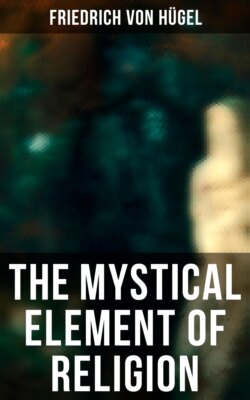Читать книгу The Mystical Element of Religion - Friedrich von Hügel - Страница 22
На сайте Литреса книга снята с продажи.
5. In Plotinus and Proclus.
ОглавлениеIn the third and last period of Greek Philosophy, we can pass by the Stoic and Epicurean, and also the Sceptical schools. For, great as was their practical importance and influence, these schools never aimed at embracing the totality of life; no one of them ever, as a matter of fact, cultivated more than one side of a purely individual self-education and peace-seeking. They reproduced and continued, on a larger scale, those interesting three minor Socratic schools which themselves had, even during the full times and universal systems of Plato and Aristotle, constituted as it were the backwaters away from the main stream of Greek speculation. The Stoic system carries on the Cynic school; the Epicurean, the Cyrenaic; and the Sceptical, the Megaric. Unity and Rest is monopolized by the Stoic, and Multiplicity and Movement by the Epicurean; whilst the Sceptic attempts to stand apart from and above both. What Socrates, Plato, and Aristotle, living in still many-sided and public-spirited times, had, in their lives and teaching, seen and practised together; now, in a period of spiritual poverty and self-seeking, is seen and practised by separate schools separately, each in external conflict with the other.
Only the system of that great mystical soul, Plotinus, has, for our present purposes, a claim on our close attention. Indeed this, the last great attempt at synthesis of the ancient Greek mind, will have to occupy us in such detail throughout a great part of this book, that here we can but briefly indicate its chief characteristics as regards the One and the Many.
It is then clear that Plotinus is an even more intensely and exclusively religious spirit than is Plato himself. Some of his descriptions of the soul’s flight from the world of sense and of the soul’s substantial touch of God in ecstasy, and again his penetrating apprehension of the timeless and spaceless characteristics of Spirit, have never ceased, at least indirectly, to leaven, and to lend much of their form to, the deepest recollective aspirations of religious souls in Europe and Western Asia, for some fourteen centuries at least.
Yet this religious sense is here so exclusive, and it thirsts so vehemently for perfect unity and for an infinite Superiority and utter Self-sufficingness of God, that it readily allies itself with, and reinforces by a massive enthusiasm and asceticism, the abstractive trend which, so strong at all times in Greek philosophy, was at this period already, for other reasons, growing more intensely abstractive than ever. Under this double influence Plotinus reduces the two great, deliberate, alternating movements of the soul,—its Outgoing to the Particular and Contingent, and its Incoming to the General and Infinite, as they are taught by Plato,—to one only, that of Recollection and Abstraction, a movement ever up and away, from all Multiplicity, to the One alone. And he denies to this One all Multiplicity whatsoever,—hence all such conscious, volitional action upon the world as is involved in Plato’s magnificent, though never worked out, intuition that it is love, (some energizing analogous to our thinking, loving and willing the existence, the self-realization and the happiness of other self-conscious beings,) which moves the Good, as it were, to go out from Itself, and to communicate Itself to others. Here, in Plotinus’s scheme, Man begins indeed with sense-impressions and imaginative picturings, with discursive reasoning and intuitive reason, with feelings, volitions, and energizings of every kind. But the more he moves up, the more of all this he leaves utterly behind; till, in ecstasy, all will, love, thought, consciousness, cease altogether. For man has thus been getting nearer and nearer, and more and more like, the One; and this One is just nothing besides sheer, pure Oneness,—it is neither Will, nor Love, nor Thought, nor Self-consciousness, in any degree or sense of these words.
Plotinus’s scheme is thus indeed prompted by some of the deepest Mystical aspirations. But whilst in its one deliberate movement—that of man up to God—it starts from convictions and requirements that are deeply ethical, libertarian, spiritual, theistic: it will be shown, in its conception of the nature of the One and of this One’s relations down into the world, to be curiously naturalistic and determinist, and subtly materialistic. Thus does Greek Philosophy end in an impressively all-devouring Abstraction, in an intense Realism destructive, step by step, of precisely all that concrete, individual, personal Beauty, Truth, and Goodness, of all the spiritual, hence organic, interior, self-conscious reality, which had given occasion to this system. We have now but so many hypostatized abstractions, each more pale and empty than the other, each ever more simply a mere category of the human mind, indeed, but a category appropriate to Things and to Mathematico-Physical Laws, not to Spirit and to Ethico-Personal Organisms. The system, in its ultimate upshot and trend, is thus profoundly anti-Immanental, anti-Incarnational: a succession of increasingly exalted and increasingly empty Transcendences, each of which is, as it were, open upwards but closed downwards, takes the place of all deliberate operations and self-expressions of the Higher in and through the Lower, hence of all preveniences and condescensions of God.
And in Proclus, practically the last non-Christian Greek Philosopher, all these intensely abstractive, naturalistic features get finally and fully systematized, whilst but intermittent traces remain of Plato’s richly manifold, organized activities and his at times strikingly incarnational conceptions; and only skeleton-schemes persist of those rapt recollective experiences of Plotinus which, derived in his case from direct experience, constitute him, among all Philosophers, as Dr. Edward Caird most aptly calls him, the “Mystic par excellence.”
